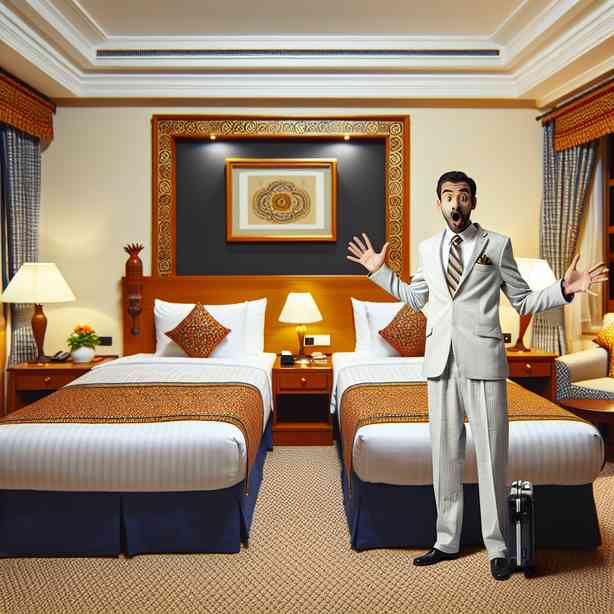
When you find yourself in a situation where you’ve requested one bed but end up with two, it may seem like a simple mix-up at first. However, this scenario can unfold into a multitude of experiences that prompt reflection on expectations, adaptability, and the nuances of travel accommodations. In this discussion, we will explore the implications of such a scenario, the potential for unexpected advantages, and how to navigate the complexities that arise.
Imagine you’ve just arrived at your hotel after a long journey, tired and ready to unwind. You’ve specifically requested a room with a single king-size bed for a personal retreat, aiming for a cozy and restful experience. But as you step into your room, you are greeted by not one but two double beds neatly arranged. Initially, frustration may wash over you; after all, this was not what you booked. However, taking a moment to reassess the situation can reveal hidden opportunities.
First and foremost, let us consider the emotional response to such an unexpected situation. It’s perfectly normal to feel a sense of disappointment or irritation when you encounter an unforeseen discrepancy in your travel plans. Acknowledging these feelings is important, but so is recognizing that this can lead to a unique experience. Perhaps this is an occasion to embrace spontaneity, a departure from the rigid expectations often associated with travel. After all, sometimes life’s little surprises lead to the most memorable adventures.
As we navigate through this scenario, it’s essential to reflect on potential advantages emerged from having two beds. For example, if you are traveling with a partner, a friend, or even a family member, the sudden presence of an extra bed can bring about opportunities for connection and bonding. Sharing a room can provide moments of laughter, late-night conversations, or a cozy space to unwind after a day of exploration. What may have initially felt like a setback can become an invitation for companionship, enhancing the overall travel experience.
Additionally, two beds can also serve as a functional advantage. Maybe you prefer to have a dedicated area for your belongings, using one bed purely for personal items while reserving the other for sleeping. Or perhaps you enjoy the luxury of stretching out in a larger space, taking full advantage of the two sleeping areas to create your own little sanctuary. This newfound flexibility can transform your stay, allowing you to tailor your environment in ways that reflect your needs and preferences.
It’s worth considering how to communicate effectively with hotel staff when faced with such a discrepancy. A polite and friendly approach can go a long way. Instead of focusing on the negative, expressing your desire for the reserved arrangement, while remaining open to solutions, can lead to a more positive interaction. The staff may offer to change your room or provide extra amenities to make your stay more enjoyable. In hospitality, effective communication is key, and it all stems from a place of understanding and kindness.
Furthermore, embracing the unexpected can lead to personal growth and adaptability. In our fast-paced lives, we often develop routines that prioritize structure. Travel should be an opportunity to break free from these constraints, allowing us to explore new environments and perspectives. When faced with an unanticipated situation, we have the chance to practice flexibility—an invaluable life skill. Learning to adapt to changes enhances our overall resilience, making future travels and experiences less stressful and more enjoyable.
Another aspect worth pondering is the broader implications of our experiences while traveling. When we encounter challenges, such as mismatched hotel rooms, we’re reminded of the importance of patience and understanding, both for ourselves and for others. Travel inherently brings us into contact with various cultures, individuals, and circumstances, each with their own unique perspectives. By remaining open to these experiences, even when they don’t align with our expectations, we can enrich our understanding of the world and the diverse ways in which people navigate life.
Yet, let’s not forget the practical considerations that might arise from this situation. If your intention was to enjoy privacy, having two beds might compromise that feeling. It can be beneficial to explore ways to create an environment that feels more personal, even in the presence of an extra bed. Throwing a blanket over one bed and using it as a makeshift lounge area or cozy corner can add a personal touch, allowing you to reclaim the space for your own comfort and enjoyment.
In reflecting on customer service and hospitality, it’s important to remember that mistakes are often unintentional and can happen to all establishments. Practicing empathy towards those who work in the service industry can create a more harmonious experience for everyone involved. Remember that hotel staff are human too; they make mistakes just like the rest of us. A gentle reminder of your original request, accompanied by kindness, can ensure that both parties leave the interaction feeling valued.
As your stay culminates and you prepare for departure, consider the memories forged in this unexpected scenario. Did the extra bed become a cozy spot for reading? Or perhaps it served as a reminder to relax and not take life too seriously? Each experience adds a layer to your journey, enriching your travel narrative and broadening your horizons.
In conclusion, finding yourself in a situation where you asked for one bed but got two is not solely about the physical space assigned to you; it is a microcosm of the traveling experience itself: unpredictable, filled with possibilities, and always an opportunity for personal growth. By embracing the unexpected, communicating openly, and adopting a flexible mindset, travelers can turn what seems like a mishap into a cherished part of their journey. As we navigate through life’s various accommodations, be they literal or metaphorical, let us take with us the lessons learned about adaptability, empathy, and the unexpected joys that await just beyond our initial expectations.


